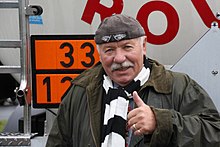Klaus Ridder (engineer)
Klaus Ridder (born August 4, 1941 in Hanover ) is a German non-fiction author .
Working life
Klaus Ridder first learned to be a car mechanic. After an internship in aircraft construction, he then studied vehicle construction at the Cologne University of Applied Sciences. After completing his studies, he was initially responsible for vehicle use at the Deutsche Bundesbahn and later at the Federal Ministry of Transport. There he gained experience, from the practical implementation of heavy goods transport to the use of ministerial vehicles. From 1973 he worked in the Federal Ministry of Transport as an expert in the transport of dangerous goods. While Klaus Ridder was working on the correction of the first edition of the "Dangerous Goods Handbook" in July 1978, one of the most serious accidents in the transport of dangerous goods occurred at the Spanish campsite Los Alfaques (south of Tarragona) with over 200 deaths. The “Dangerous Goods Handbook” was still a one-volume work at that time. Over 300 supplementary deliveries have appeared since 1978. In the meantime the work has grown into an extensive compendium with ten volumes and over 5000 pages of content. Klaus Ridder worked for the Federal Ministry of Transport until his retirement in 2001 and was active in many national and international bodies dealing with the transport of dangerous goods. He was chairman of the Central Commission for the Navigation of the Rhine in Strasbourg, of the Economic Commission for Europe in Geneva and of the International Atomic Energy Organization in Vienna and has given countless specialist lectures around the world (including in São Paulo, Yokohama, New Orleans, Washington, Moscow , Kiev, Merida, Zielona Góra, Strasbourg, Vienna, Paris, The Hague, Zurich, Antwerp, Maastricht and Colombo). Under his presidency, the revised ADN (= European Agreement on the Carriage of Dangerous Goods by Inland Waterways) was completed in Geneva in 1993.
After his retirement, he continued to lead the Munich Dangerous Goods Days until 2015 and the International Inland Shipping Dangerous Goods Days until 2019 and moderated the Dangerous Goods Safety Days at the Nürburgring.
Motorsport
Klaus Ridder has been involved in motorsport since his youth and has published two books about the Nürburgring . His pictures from 60 years of motorsport photography have been exhibited in the Federal Ministry of Transport, in the racing museum at the Nürburgring, in the branches of the Kreissparkassen of the Rhein-Sieg district and at the Caracciola Club in Remagen. He gives lectures on racing topics at the Nürburgring and at motorsport events. He was press spokesman for the 'Friends of the Nürburgring eV' initiative and, for a short time, chairman of the Graeflich Berghe von Trips' sports foundation in Hemmersbach Castle.
Others
Klaus Ridder deals privately with questions of energy and the environment and is a member of the working group "Energy and Environment - The Realists". He is one of the climate change deniers and claims in a blog article about the World Climate Conference in Paris in December 2015: "To date, there is no scientific evidence that the increased CO2 emissions are responsible for climate change." On November 29, 2013, Klaus Ridder from the Association of Motor Journalists (VdM) was awarded the Johny Rozendaal watch at the Essen Motor Show for his services to motor journalism. On the homepage of the local community of Helstorf (Stadt Neustadt a. Rbge.-Landkreis Hannover), Klaus Ridder regularly publishes youth memories.
Works
dangerous goods
- Hazardous Goods Handbook (together with Jörg Holzhäuser); 1978; ecomed-Verlag, Landsberg am Lech; ISBN 978-3-609-77000-0
- The dangerous goods driver ; 2009; ecomed-Verlag, Landsberg am Lech; ISBN 978-3-609-66347-0
- ADR 2019 (together with Jörg Holzhäuser); 2018; ecomed-Verlag, Landsberg am Lech; ISBN 978-3-609-69339-2
- Historical dangerous goods ; 2015; ecomed-storck GmbH, Landsberg am Lech; ISBN 978-3-86897-290-0
Motorsport
- Nürburgring: 50 years there live ; Sutton-Verlag, Erfurt 2003, ISBN 3-89702-605-8 .
- Heroes of the Nürburgring ; Sutton-Verlag, Erfurt 2007, ISBN 978-3-86680-073-1 .
Web links
- www.klaus-ridder.de (own homepage)
- www.motorsportridder.de (own homepage on motorsport topics)
- Literature by and about Klaus Ridder in the catalog of the German National Library
- Los Alfaques - A tragedy with consequences (PDF; 203 kB); In: The Dangerous Goods Commissioner, volume 3, March 2005
- https://www.ecomed-storck.de/autoren/Klaus-Ridder/
- http://www.ageu-die-realisten.com/uber-uns
- https://motorjournalist.de/?s=Klaus+Ridder
- https://www.kabinett-online.de/?s=Klaus+Ridder
Individual evidence
- ↑ http://www.sv-veranstaltungen.de/site/wp-content/uploads/2014/08/Nachbericht_Abschied-Klaus-Ridder.pdf
- ↑ [1]
- ↑ memories of youth .
| personal data | |
|---|---|
| SURNAME | Ridder, Klaus |
| BRIEF DESCRIPTION | German non-fiction author |
| DATE OF BIRTH | 4th August 1941 |
| PLACE OF BIRTH | Hanover |
